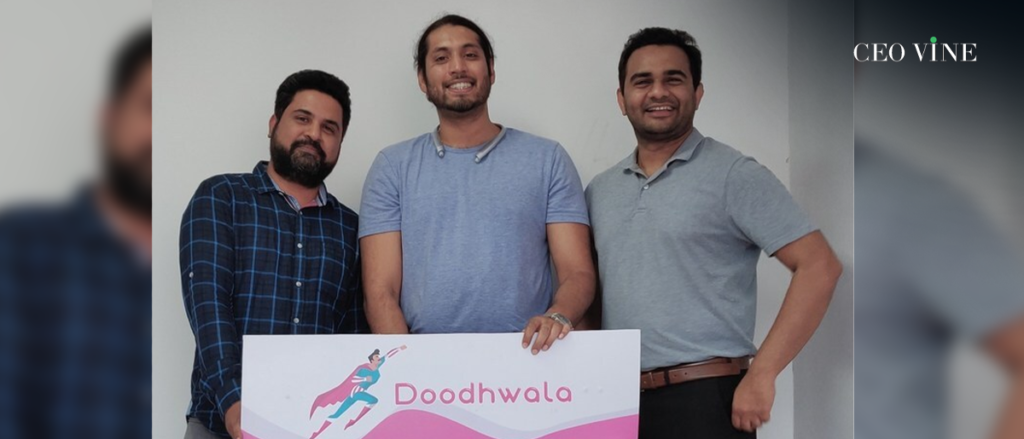Doodhwala, a milk-tech startup, emerged in 2015 with a simple but powerful mission: to deliver fresh milk and other morning essentials to customers’ doorsteps by 7 am.
Founded by Aakash Agarwal and Ebrahim Akbari, the startup quickly became a prominent player in the hyperlocal delivery space. Focusing on subscription-based grocery delivery across Bengaluru, Hyderabad, and Pune, the brand attracted a loyal customer base looking for convenience in their daily routines.
With its commitment to freshness and a subscription model, Doodhwala initially gained significant traction. The startup raised around $200 million in funding early on, a testament to investors’ confidence in its potential for rapid growth.
As it expanded to multiple cities, Doodhwala positioned itself as a unique offering in the grocery delivery market. However, this rapid growth brought with it a host of operational and financial challenges that the company struggled to overcome.
Despite a promising start, Doodhwala faced numerous obstacles that led to its unexpected shutdown in 2019, with its customer base eventually transferring to FreshToHome.
So, what caused the downfall of a startup that once captivated both consumers and investors with its fresh approach?
Factors That Led to Doodhwala’s Failure
1. Operational Inefficiencies and Logistical Challenges:
As Doodhwala grew, managing a seamless supply chain became a significant challenge. The startup encountered logistical issues, including delivery delays and inventory mismanagement, which led to frequent errors in orders.
This customer dissatisfaction gradually damaged Doodhwala’s reputation and slowed its growth.
Scaling up a delivery-focused business requires robust logistics, but Doodhwala’s struggles highlighted that growth without operational efficiency can be risky. In the highly competitive grocery delivery space, even minor service lapses can lead to customer loss—a reality Doodhwala faced.
2. Intense Competition in the Grocery Delivery Market:
The grocery delivery space was becoming increasingly competitive, with companies like BigBasket, Milkbasket, and SuprDaily aggressively expanding their reach. These competitors had better funding, operational experience, and advanced technology, giving them a substantial edge.
While Doodhwala focused on milk and essentials, its lack of differentiation in a crowded market made it vulnerable. Larger competitors offered broader product ranges, attractive deals, and superior customer engagement strategies, which left Doodhwala struggling to compete.
3. Financial Mismanagement and Cash Flow Problems:
Despite raising significant funds, Doodhwala faced challenges in managing its finances effectively. Its high cash burn rate was unsustainable, and issues with financial record-keeping reportedly emerged.
As cash flow became critical, the startup struggled to maintain relationships with vendors and employees, with some even filing legal complaints due to unpaid dues.
Moreover, Doodhwala relied heavily on discounts and cashbacks to attract customers, which further strained its finances. These promotions helped attract new users but didn’t foster long-term loyalty, ultimately weakening the company’s financial foundation.
4. Failure to Adapt to Market Trends and Customer Expectations:
Doodhwala’s primary focus on milk faced challenges as consumer preferences shifted. Health consciousness, the rise of veganism, and environmental concerns led to declining demand for dairy. Customers became more concerned with the freshness, purity, and source of their groceries, creating pressure for Doodhwala to keep up with these evolving expectations.
Also Read: 10 Ways to Turn Your Startup into a Billion-Dollar Unicorn
India has seen an incredible surge in unicorn companies, especially in the technology sector.
India is now the third-largest startup ecosystem in the world, trailing only the US and China, with over 115 unicorns as of 2023.
Additionally, as the market matured, customer expectations around technology, user experience, and service quality grew. Doodhwala’s platform reportedly faced technical issues, frustrating users and impacting customer retention. The lack of investment in enhancing the user experience was a missed opportunity in an industry where seamless technology is essential.
By 2019, Doodhwala faced insurmountable challenges and ultimately decided to shut down, transferring its customer base to FreshToHome.
Doodhwala’s journey is a reminder that in the startup ecosystem, vision and funding alone aren’t enough. Sustainable success requires meticulous planning, sound financial management, and the ability to adapt to changing market demands.
